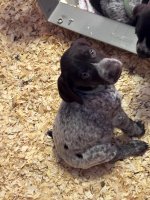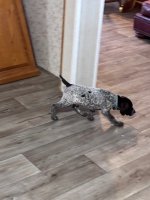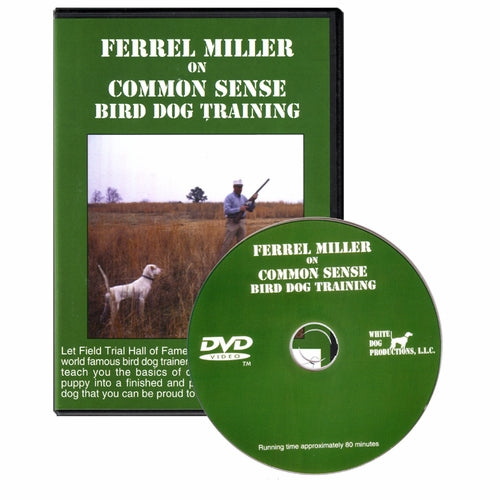Adorable dog! As someone who brought home my second GSP last April, I agree with others. Get them in the field as soon as basic commands are on lock. Our first hunt was at 7 months, and the last for this season was at 10 months. So much changed throughout the year, and I am so so thankful I stuck with the drama and frustration of a puppy in the field. It went from a little bit of dread letting her out of the truck to pure joy watching her work.
To clarify (if you intend to read the rest of this...) I am NOT even remotely a professional trainer. I am a dude with a full time job, who drives 2hrs away from the house every single weekend to hunt. I have not trained as much, or as thoroughly as I should have, and I am paying for it on the back end. I also am probably a little looser in my requirements for my hunting dogs than other hardcore guys. Dogs get to have fun in the field too, not just work for me.
Here are the issues I had with my second GSP pup:
- Biting anything and everything. What a pain. Not specific to the breed, but I feel generally that pointers are more stubborn and headstrong.
- Kennel training was very tough. Took until about 8 months of age before she grew out of barking, yapping, whining, general grumbling in the kennel. Overnight noise was quick to go, but knowing we were out and about and interacting with her older GSP sister were too much for a long time. Consistency is key here along with anywhere else.
- Recall. Great in the yard, bad in the field. Striking change over 3 months of in field training.
- Recall in relation to non-game species. I had more than one occasion of bumping deer and her high tailing off. Which is tough when you bump 6-12 deer every day of hunting. Especially bucks around the rut. For some reason she liked that smell. Non-existent issue now.
- Wide working range. This shortened with time and learning how to hunt birds. I personally feel shorter ranges can be encouraged, not trained. I found that following her wherever she wanted to go worked really well to keep me close, and eventually I worked up to directing her where I wanted her to travel. She runs where she wants, until we hit a point where I don't want to go that direction. (Around cedars on this side vs that one, around these cattails, etc.)
- They have a MOTOR. My average day this year was about 9 miles. Usually 1.5-2 miles per walk. She has no quit, and will injure herself long before she stops. I think this can be said for all dogs, but my opinion is that it is stronger with lean and mean pointers than it is with something like a lab. Maybe I am wrong there, just my opinion.
- The motor isn't only present when you are hunting... The first couple of weeks are easy because you expect to dedicate every waking hour to the dog. 6 months in and you want to have a cocktail and watch your favorite episode of The Bachelor, it gets a bit annoying. Our dogs run on leash about 15-20 miles a week plus 2 days of hunting when in season. It still isn't enough, and the drama that envelops a GSP gets very tough when you aren't in the proper mental headspace to deal with it and give them the stimulation they need.
- 2/1 marks month 11, and she is still very much a puppy. But sometime this fall, amidst the tiring field hours and truck time, she truly became a working dog, moving with purpose. What an amazing thing that was to see progress.
All that being said, I can't imagine ever having a hunting and life buddy other than a shorthair.
Get ready for Hell.





